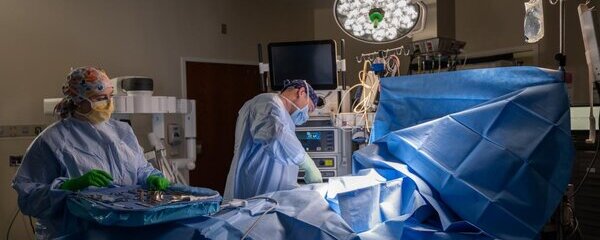
For many people born with congenital heart disease, reaching adulthood used to be a major milestone. But advances in surgical care and ongoing innovation have changed the landscape for these patients, and UVA Health is leading the way.
Today, thanks to improved treatments and earlier diagnoses, more than 90% of children with congenital heart defects survive into adulthood. These patients need expert, continuous care throughout their lives. UVA Health is one of the few institutions equipped to provide that continuity with a comprehensive Adult Congenital Heart Disease (ACHD) program.
Jared Beller, MD, a cardiac surgeon with UVA Health, specializes in caring for adult congenital heart disease patients. “These are patients who often undergo major interventions in childhood and need consistent, expert care as they grow older,” he explains. “Our program is designed to meet them where they are, whether they’ve been followed closely since childhood or are being diagnosed for the first time as adults.”
Congenital Heart Care for Life
It’s a common misconception that congenital heart conditions are always detected early. In fact, many congenital defects don’t cause symptoms until adulthood, or the symptoms are mild enough to go undetected for decades, only becoming apparent when they lead to heart rhythm issues, shortness of breath, or heart failure. That’s why access to lifelong, specialized care is essential.
At UVA Health, the ACHD Program offers patients seamless access to care from pediatric to adult congenital heart specialists. The program also features an array of advanced services, including:
- Comprehensive evaluation and diagnostic imaging
- Advanced therapies and devices for heart failure
- Minimally invasive cardiac catheterization procedures
- Full electrophysiology services to manage heart rhythm issues
- Genetic testing and family planning support
- Social work and financial assistance for long-term care planning
UVA Health is also home to one of the largest cardiovascular surgery programs in the mid-Atlantic. It offers surgical, structural heart, and electrophysiology expertise that few institutions can match.
“Our strength lies in our team-based approach,” says Beller. “We collaborate closely with surgeons, interventional cardiologists, electrophysiologists, heart failure specialists, imaging experts, and genetic counselors. Every care plan is tailored to the individual patient, not just their diagnosis.”
Support That Goes Beyond the Clinic
Beyond direct patient care, the ACHD program also advances congenital heart disease research to help improve outcomes. UVA Health’s commitment to innovation ensures patients benefit from the latest therapies, technologies, and evidence-based practices.
The program also focuses on the broader life experiences of adult congenital patients. Many are navigating their healthcare needs while also planning families or managing careers. Genetic counseling, mental health support, and care coordination help address these challenges holistically.
“Our patients are living full, active lives,” Beller emphasizes. “We’re here to support that, not just by treating disease, but by helping them thrive.”
A Leader in Seamless Continuity of Care
With nationally recognized pediatric and adult cardiology programs, UVA Health offers a rare continuum of care that spans from infancy through adulthood. It’s one of the reasons UVA Health is a regional and national destination for congenital heart care.
At UVA Health, patients have access to treatments and services they won’t find everywhere. “For transplantation, there are new organ preservation techniques and new donor pools that are available,” says Beller. “That will really expand the opportunities for transplant for this patient population.” He also highlights the Ross procedure, an important option for younger adults with aortic valve disease. The Ross procedure offers an alternative when repair isn’t possible and traditional valve replacements pose trade-offs. By using the patient’s own pulmonary valve to replace the aortic valve, the operation can avoid issues like degeneration or lifelong anticoagulation, but it requires significant expertise. Beller explains, “It’s a technically challenging operation that not a lot of surgeons offer. And so, we offer that in our program here.”
“Patients may come to us from across the state or even farther because they know they’ll receive expert, compassionate, lifelong care,” says Beller.
As more congenital heart patients transition into adulthood, the need for adult congenital heart disease programs will only grow. By integrating advanced technology, research, and personalized support, UVA Health ensures that these patients not only survive but also flourish.